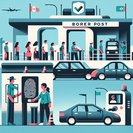
A small rectangle of cardboard that has accompanied generations of visitors to Paris disappeared today as Île-de-France Mobilités (IDFM) ended sales of paper ‘t+’ tickets across the metro, RER, tram and bus networks. From 5 November, travellers must use Navigo Easy or smartphone tap-and-go options; cash ticket sales on buses are replaced by contactless bank-card validators.
Why it matters for global mobility. The change simplifies expense management for expatriates and short-term assignees, who can now load single trips or carnets onto reloadable cards and obtain VAT-compliant e-receipts. It also eliminates the risk of magnetic-stripe demagnetisation that frequently stranded foreign visitors. For large relocation projects, employers can bulk-order pre-loaded Navigo Easy cards and distribute them on arrival.
![Paris retires paper metro tickets, pushing tourists and commuters onto fully digital fare media]()
Transition arrangements. Unused paper tickets remain valid until 30 April 2026 and can be exchanged free of charge at major stations. Ticket-vending machines now default to NFC purchases, but staffed counters provide assistance in six languages. IDFM reports that more than 80 % of occasional users already migrated to digital media during the pre-cut-over ‘paperless summer’ trial.
Accessibility and privacy. Critics note that tourists without NFC-enabled phones must pay €2 for a plastic card, while anonymous purchases will become harder once ID verification is added to anti-fraud measures in 2027. IDFM counters that fare evasion fell 9 % during the pilot and that digital data will feed real-time occupancy dashboards, helping regulate crowding during the 2026 Olympics Legacy events.
Next on the agenda. Paris will pilot intercity TGV ticketing via the same Navigo wallets in 2026, an innovation watched closely by other EU capitals seeking seamless urban-long-distance integration.
Why it matters for global mobility. The change simplifies expense management for expatriates and short-term assignees, who can now load single trips or carnets onto reloadable cards and obtain VAT-compliant e-receipts. It also eliminates the risk of magnetic-stripe demagnetisation that frequently stranded foreign visitors. For large relocation projects, employers can bulk-order pre-loaded Navigo Easy cards and distribute them on arrival.

Transition arrangements. Unused paper tickets remain valid until 30 April 2026 and can be exchanged free of charge at major stations. Ticket-vending machines now default to NFC purchases, but staffed counters provide assistance in six languages. IDFM reports that more than 80 % of occasional users already migrated to digital media during the pre-cut-over ‘paperless summer’ trial.
Accessibility and privacy. Critics note that tourists without NFC-enabled phones must pay €2 for a plastic card, while anonymous purchases will become harder once ID verification is added to anti-fraud measures in 2027. IDFM counters that fare evasion fell 9 % during the pilot and that digital data will feed real-time occupancy dashboards, helping regulate crowding during the 2026 Olympics Legacy events.
Next on the agenda. Paris will pilot intercity TGV ticketing via the same Navigo wallets in 2026, an innovation watched closely by other EU capitals seeking seamless urban-long-distance integration.









